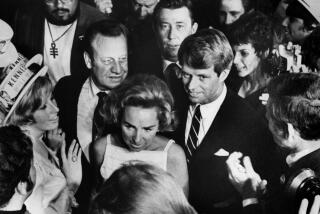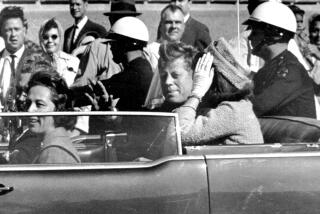Stetson Kennedy dies at 94; writer exposed the KKK
- Share via
Author and folklorist Stetson Kennedy, who infiltrated the Ku Klux Klan six decades ago and exposed its secrets but decades later was criticized for appearing to exaggerate his exploits, died Saturday at a medical center near St. Augustine, Fla. He was 94.
The death was announced on his website.
In his 1954 book “I Rode With the Ku Klux Klan,” Kennedy wrote that he gained entrance to the Klan by posing as an encyclopedia salesman and using the name of an uncle who was a Klan member. The book was rereleased in 1990 as “The Klan Unmasked.”
“Exposing their folklore — all their secret handshakes, passwords and how silly they were, dressing up in white sheets” was one of the strongest blows delivered to the Klan, Peggy Bulger, director of the American Folklife Center at the Library of Congress, told the Associated Press in 2007.
“If they weren’t so violent, they would be silly,” said Bulger, who wrote her doctoral thesis on Kennedy’s work as a folklorist.
After a back injury kept him out of the military during World War II, Kennedy began crusading against what he called “homegrown racial terrorists.” He served as director of fact-finding for the southeastern office of the Anti-Defamation League and as director of the Anti-Nazi League of New York.
With evidence salvaged from the grand dragon’s wastebasket, he enabled the Internal Revenue Service to press for collection of an outstanding $685,000 tax lien from the Klan in 1944 and he helped draft the brief used by the state of Georgia to revoke the Klan’s national corporate charter in 1947. He also testified in other Klan-related cases.
In the late 1940s, Kennedy exposed the Klan’s secrets on the national stage through the “Superman” radio series, which used information he provided in episodes titled “Clan of the Fiery Cross.”
After initially praising Kennedy’s courage in their bestselling 2005 book “Freakonomics,” co-authors Stephen J. Dubner and Steven D. Levitt alleged that Kennedy misrepresented portions of “The Klan Unmasked.”
Writing in 2006 in the New York Times, the authors contended that a number of events Kennedy described were embellished or based on secondhand information. They also accused of him of failing to properly credit other undercover agents.
In response, Kennedy acknowledged that the charges held some truth but said that he had admitted as much to Bulger 20 years earlier.
Bulger defended Kennedy, saying he was always candid about combining two narratives into one and had written it in the style of a Mickey Spillane thriller to help it get published.
“It was common at the time to embellish,” Bulger said, “but he actually did infiltrate the Klan to do this work. He was always upfront, he never lied.”
He also provided reams of documents verifying his undercover work, according to the New Georgia Encyclopedia.
“It was hardly a cover-up,” Kennedy once said. “I’ve been doing this for too many decades to owe anybody much of an apology.”
William Stetson Kennedy was born Oct. 5, 1916, in Jacksonville, Fla., and was related on his mother’s side to hatmaker John B. Stetson.
While working for the Federal Writers Project in Florida during the Depression, Kennedy collected oral histories alongside noted African American writer Zora Neale Hurston.
When Kennedy unsuccessfully ran for governor of Florida in 1952, his friend, singer-songwriter Woody Guthrie, wrote lyrics for a campaign song.
After Kennedy was unmasked while testifying about the Klan, he traveled widely for a decade beginning in 1952.
He published another book, “Jim Crow Guide to the U.S.A.” (1959), in France and spent the rest of his professional life working for community development agencies in the Jacksonville area.
Of Kennedy’s efforts to expose the Klan, former Georgia Assistant Atty. Gen. Daniel Duke once said: “Stetson didn’t do it all. But he did plenty.”
In 2006, he married for a seventh time. His wife, Sandra Parks, a former city commissioner and bookstore owner in St. Augustine, is among his survivors.
More to Read
Start your day right
Sign up for Essential California for the L.A. Times biggest news, features and recommendations in your inbox six days a week.
You may occasionally receive promotional content from the Los Angeles Times.





















































